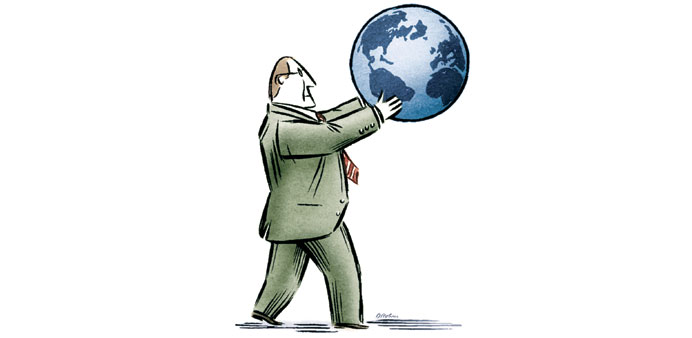|
This month, an independent review panel is expected to release its findings regarding the World Bank’s Doing Business report. Speculation abounds that the panel might recommend outsourcing Doing Business, removing its rankings of countries for the ease of doing business in them, or even eliminating the report altogether. |
This challenge is not a new one, as powerful World Bank shareholders have been trying to sink the project since its inception in 2002. Now China, the world’s second-largest economy and increasingly influential within the Bank, is seeking to water down the report by eliminating, among other things, its country rankings. (This year, Doing Business ranked China 91st out of the 185 national economies it examined.)
But gutting or cutting Doing Business would be a grave error and would essentially result in throwing a healthy baby out with the bathwater. Its methodology is largely sound, its purposes are valid, and its findings are useful.
The 2013 report includes quantitative data grouped in 11 sets of indicators, ranging from the ease of starting a business to the availability of credit.
The data are compared across economies and over time to rank 185 countries in ten categories of business regulation, such as “Resolving Insolvency” and “Trading Across Borders.” Input from respondents around the world – more than 9,600 this year – influences the report’s conclusions.
Doing Business is not intended to be a comprehensive review of each country’s economy. Rather, it seeks to provide policymakers with benchmarks that can serve as a starting point for discussion of beneficial reforms.
In fact, the report’s simplicity is the key to its effectiveness. Doing Business has been a leader in synthesising subjective and quantitative data to create understandable metrics. By limiting the total number of indicators studied and producing clear benchmarks, it helps policymakers to define their objectives and to improve the efficiency of regulation in crucial areas.
Moreover, Doing Business helps to break down barriers – particularly in developing countries – that can discourage the establishment of small and medium-size enterprises, provide opportunities for corruption, and drive small business owners to the informal sector. For example, the data that Doing Business provides can help to generate the political will and public support needed to overcome opposition to competition-boosting measures from entrenched actors that have an interest in maintaining high entry barriers or procedural bottlenecks.
The project has been a rare World Bank success, recording almost 2,000 reforms over the past decade, and has proved to be a valuable tool for policymakers in developing economies to spur reform and enhance investment. Rwanda, for example, has skyrocketed in the rankings, from 143rd in 2009 to 52nd in 2013.
Similarly, as Georgia has climbed to ninth in the rankings, its GDP has risen by more than 200% and foreign investment inflows have increased by nearly 300% since 2003. Of all of the economies included in the report, only Zimbabwe and Venezuela have failed to maintain or improve their indicators since 2005.
But such success stories have not deterred the project’s critics. Early criticism came from France, which vigorously objected to the 2004 and 2006 editions’ endorsement of the “legal origins” theory, which suggests that common-law countries benefit from greater regulatory efficiency than civil-law countries.
China, like France in the past, objects to the perceived Anglo-American bias of Doing Business. Others criticise the report’s methodology, claiming that the indicators are not inclusive or that they improperly measure countries’ regulatory environments. Still others have argued that Doing Business contains built-in biases against regulation and taxation, which may create incentives for countries to enact reforms that game the system rather than produce meaningful results.
To be sure, not all of these objections are without merit; there is certainly room for methodological improvement. That is why Doing Business adjusts its indicators every year based on feedback and review. For example, following criticism of the “Employing Workers” indicator, the International Finance Corporation (the World Bank’s private-sector lending arm) conducted a review and removed it as a contributing factor to the rankings. A similar review should be carried out on other indicators, such as “Paying Taxes,” with any changes tailored to enable continued comparison across time, one of the project’s main benefits.
Given that the project’s methodological flaws can be addressed with targeted review and reform, doing away with Doing Business altogether would be extreme and unnecessary. Countries like France, China, and India, dissatisfied with their low rankings, should not be allowed to eliminate or cripple the project.
Indeed, outsourcing or cutting Doing Business could damage the World Bank’s standing. Just last month, US Treasury Secretary Jack Lew trumpeted Doing Business in congressional testimony justifying American support for multilateral development banks. More broadly, backing away from such a project would undermine the Bank’s promotion of rule-based systems and legal certainty – and would weaken the reformers in developing and emerging economies who seek to transform clientilist and patronage-based economies.
Finally, while Doing Business focuses on helping the poorest countries to improve their economic performance, it also influences advanced-country policymaking and business practices. If the project is eliminated, European policymakers will be denied important information that could help to guide discussions about enhancing competitiveness. For example, registering property in Greece is more difficult than in Djibouti; enforcing a contract in Italy takes roughly three times as long as it does in Vietnam; and starting a business in Spain takes roughly 3.5 times longer than in Azerbaijan.
Doing Business does not provide policy solutions. But it does provide a rigorous, credible framework for policy debate – and thus an opportunity that no economy can afford to lose. - Project Syndicate
♦ Ana Palacio, a former Spanish foreign minister and former Senior Vice President of the World Bank, is a member of the Spanish Council of State.

